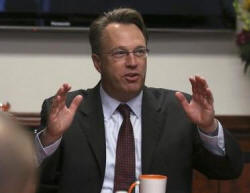|
"A
typical estimate is that a 1 percent loss in GDP is associated
with a 4 percent reduction in house prices," San Francisco Fed
President John Williams said in remarks prepared for delivery in
Jakarta.
"This implies a very costly tradeoff of using monetary policy to
affect house prices when macroeconomic and financial stability
goals are in conflict."
Central bankers have argued for years over whether monetary
policy should be used to head off risks to financial stability
when poor economic conditions would not otherwise call for
higher interest rates. Williams's own research and his
interpretation of a range of other studies presented at the Bank
Indonesia–BIS Conference bolster the argument that it should
not.
That, of course, does not mean Williams opposes raising U.S.
interest rates fairly soon. To the contrary, he has said
previously he believes the Fed should probably raise interest
rates a couple of times before the end of the year.
"If the housing sector and the overall economy are both booming,
then tighter monetary policy may serve to both reduce the risks
to the financial system and keep economic activity from
exceeding desired levels," said Williams, whose bank is
headquartered in one of the hottest housing markets in the
United States.
(Reporting by Ann Saphir; Editing by Ken Wills)
[© 2015 Thomson Reuters. All rights
reserved.] Copyright 2015 Reuters. All rights reserved. This material may not be published,
broadcast, rewritten or redistributed. |
|





